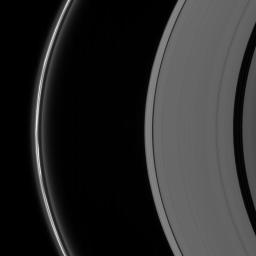
|
Disturbances by Prometheus
- Click the image above for a larger view
- Full-Res JPEG (1008 x 1008) (36.3 kB)
- Full-Res TIFF (1008 x 1008) (1.0 MB)
Caption:
The clumpy disturbed appearance of the brilliant F ring constantly changes. The irregular structure of the ring is due, in large part, to the gravitational perturbations on the ring material by one of Saturn's moons, Prometheus (102 kilometers, or 63 miles across).
Interior to the F ring, the A ring bears a striking resemblance to a classic grooved, vinyl record. Visible here are the Keeler gap (42 kilometers, or 26 miles wide) and the Encke gap (325 kilometers, or 200 miles wide).
The image was taken using a spectral filter sensitive to wavelengths of infrared light centered at 862 nanometers. The view was acquired with the Cassini spacecraft narrow-angle camera on July 26, 2006 at a distance of approximately 1.5 million kilometers (900,000 miles) from Saturn and at a Sun-Saturn-spacecraft, or phase, angle of 141 degrees. Image scale is 8 kilometers (5 miles) per pixel.
Background Info:
The Cassini-Huygens mission is a cooperative project of NASA, the European Space Agency and the Italian Space Agency. The Jet Propulsion Laboratory, a division of the California Institute of Technology in Pasadena, manages the mission for NASA's Science Mission Directorate, Washington, D.C. The Cassini orbiter and its two onboard cameras were designed, developed and assembled at JPL. The imaging operations center is based at the Space Science Institute in Boulder, Colo.
For more information about the Cassini-Huygens mission visit http://saturn.jpl.nasa.gov/home/index.cfm . The Cassini imaging team homepage is at http://ciclops.org .
Cataloging Keywords:
| Name | Value | Additional Values |
|---|---|---|
| Target | Saturn Rings | Encke Gap, F Ring, Prometheus, Saturn |
| System | Saturn | |
| Target Type | Ring | Gap, Planet, Satellite |
| Mission | Cassini-Huygens | |
| Instrument Host | Cassini Orbiter | |
| Host Type | Orbiter | |
| Instrument | Imaging Science Subsystem (ISS) | |
| Detector | Narrow Angle Camera | |
| Extra Keywords | Clump, Grayscale, Infrared, Visual, Wave | |
| Acquisition Date | ||
| Release Date | 2006-09-05 | |
| Date in Caption | 2006-07-26 | |
| Image Credit | NASA/JPL/Space Science Institute | |
| Source | photojournal.jpl.nasa.gov/catalog/PIA08259 | |
| Identifier | PIA08259 | |
